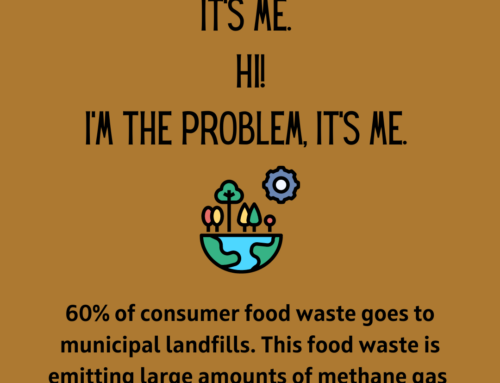I really enjoy attending my national associations annual conference. Every year I peruse the exhibits, passing by some booths, and stopping at others. I pick up some written material (new product info, or nutrition profiles) and also pick up some of the actual product samples. Not only do these serve as mid-morning snacks, but I get to sample products to determine if they are something I want to buy or recommend.
For the past couple of years there has been a few association members who are questioning the corporations who sponsor both the meeting and partner with the organization. Sponsorship is not an issue to me. Yes, I feel there should be thoughtful and open discussion about sponsorship guidelines, but I still contend that for a “food and nutrition” association, food companies (even those that some like to call “big food”) have a place there.
I am not a member of the group formed within the past year called “Dietitians for Professional Integrity” (DFPI). Certainly this is not because I don’t have professional integrity, I do, and practice under the guidance of my association’s code of ethics. I always disclose when I am writing, speaking, or otherwise working for or representing a company or client. Some registered dietitians have “signed on” with DFPI not really knowing what they are signing on for. I have seen the group act in ways that is the opposite of integrity, and I frankly don’t support their methods of communication (bashing industry, one-sided “unhealthy” call outs to company’s such as Pepsico or McDonalds, and questioning dietitians who work for food companies or corporations).
DFPI’s stance is that there are some food companies (“Big Food”) or food associations (“Big Ag”) that have no place at all partnering with our food and nutrition association. While their focus seems to be in the interest of public health, they ignore the fact that 1.) The public consumes these foods, and 2.) a large percentage of our membership works in the food business, not the health business. And, that it is a business. Anyone who has ever attempted to organize a large community or professional event of any kind certainly knows that sponsorship is critical. The money to support the event or meeting has to come from companies or businesses who have an interest in your organization. In our case, food companies certainly have an interest.
It will be a slippery slope to eliminate a few sponsors, but keep the rest. On what grounds will a small organic company that makes fake “fruit and veggie snacks” be okay to have in the exhibit hall, but a large chocolate company, not be okay (even though we know that people do indeed enjoy eating chocolate, and there may be some health benefit to the flavonoids within it). Companies have a right to get their own fact-based information out there.
Real or Fake?

“Eat more whole foods”, is often advocated in the context of a healthy diet which should limit processed, packaged food. Is this “real fruit and veggie snack” an okay processed food to include in the exhibit hall?
This year at FNCE©, I picked up this new packaged snack called Shredz™. They tasted alright, they weren’t spectacular. Sure, they are made from organic fruits and vegetables purees or concentrates (the ingredient list also includes pectin, citric acid and natural flavors – nothing to worry about, but added to create this packaged snack food), but it’s not “real fruits and vegetables” nor is it a “whole food”.
Sure, give them a try if you like, but I still recommend eating real apples and pears, and real carrots. I think there’s a bigger issue with these kinds of snacks being substituted for “real fruit”, as opposed to comparing potato chips to baked potatoes. The chips are clearly a treat, not an intentional substitute for fresh potatoes.
I hope that folks can agree to disagree, and not assume there is one right way to deal with sponsorship. Large national meetings require quite a bit of money to organize, and I enjoy being able to choose to visit various food companies all in one spot while I’m there. It’s my personal choice to choose to purchase food and beverage products, or not. It’s my professional obligation to share the facts about these foods and beverages, and help consumers understand how to limit or include them in a healthy lifestyle.
Let’s not over process it. The fact is, companies are in business to do business and make money. Many also choose to do good (as in donating to foundations or charity) and most respect the input from the registered dietitians on their team who work on nutrition education or product development. Peace.





Great blog, Rosanne! The small minority of Academy members (and nonmembers teaming up with them) do not represent the majority of our members who realize that all foods can fit into a healthy diet and it’s our role as science-based nutrition professionals to help them see how they they can eat a nutrient-rich diet and still include foods they love. Rather than bashing industry, we should be (and are) working with them to promote balanced nutrition for everyone.
“I always disclose when I am writing, speaking, or otherwise working for or representing a company or client.”
That’s wonderful.
But the definition of conflict of interest also encompasses the mere possibility or perception of a conflict.
To that end, might it not be important in this piece for you to note that your current clients include the Corn Refiner’s Association and the American Beverage Association?
Hi Yoni. There is no conflict of interest, these are my opinions and I was not compensated for this article.
I include a Disclaimer tab on the blog itself, which as you know, lists my clients. I also have a link in this piece, to that page, so I’d say I did note this.
Thanks for reading.
A very HAPPY THANKSGIVING to you and your family
I think you bring up some good points when it comes to what food companies should be allowed within the particular event you attended, and honestly in any type of similar situation. Being from an educational background where it has been instilled in me the importance of proper diet, I can see were some wouldn’t be happy with the decision to include “big food”, as you called it, in a health food event. However, there is also another side to situation. Yes, these companies tend to offer processed food and things that overall, are not particularly healthy, but that doesn’t necessarily mean they aren’t trying.
Like you stated, many big food companies employee nutritionists and actively use their knowledge and information to help better themselves. Over the last few years there has been a movement in fast food companies, and other large food corporations. Though the changes are small (offering apples slices instead of french fries, milk instead of soda, locally grown produce instead of commercially grown, etc.), they are changes, and they are typically in the direction of a healthier array of foods.
These small changes don’t make up for the unhealthy and over-processed food they offer but it does offer some balance to the mix. It lets us know that they do have some good intentions, but just as in many cases, business often comes first. However, just because they don’t offer the healthiest food doesn’t mean they don’t have a right to have their food facts offered, just as any organic company should.
One thing you said that really caught my attention was that many “healthy” food companies will make snacks or foods meant to substitute fruits and vegetables, and this is becoming increasingly popular. If this is someone’s only means of getting their necessary daily intake of fruits and veggies, then okay, but I don’t think one should eat these snacks over a fresh apple or salad. Like I’ve mentioned several times, convenience has dictated our lives for so long that many find it easier to grab a prepackaged bag of snacks rather than a banana, or taking the time to prepare a salad. This can be just as detrimental to our nation’s health as potato chips. I say this because many companies will use the words “organic” or “whole grain” when in fact they are inaccurately using these words to make people feel as if they are eating healthier, when they often aren’t.
In the end, everyone deserves the right to disseminate their information and food facts, and we as individuals have the right to choose what we will believe and what we will buy or support. It’s all a matter of opinion, and in mine, I would like to believe that most of these companies are trying to make a difference in the world we live in, whether it is our health or our welfare, or something different all together. I like to see the good in people rather than their flaws, which is why I tend to keep an open mind about “big food” companies. One such article that goes in depth on the topic of contributions and accusations of these companies is listed below. It is a very good read, and one that leaves you with a better understanding of the contributions these companies make, both good and bad. It is a bit long but worth a glance.
The article I mention earlier:
GROW, OXFAM. (2013 February). Behind the brands. Retrieved from http://www.oxfam.org/sites/www.oxfam.org/files/bp166-behind-the-brands-260213-en.pdf
[…] posted an article last week about the current sponsorships of the Academy of Nutrition and Dietetics, my professional […]